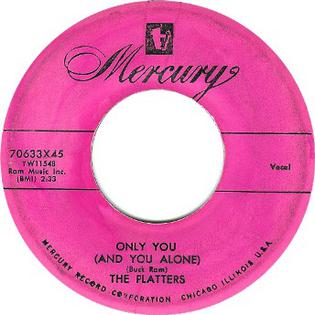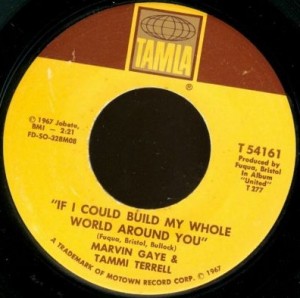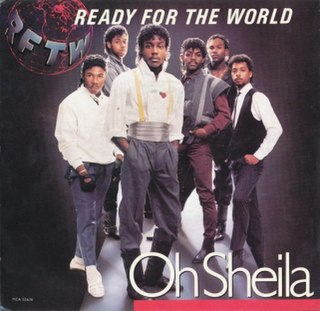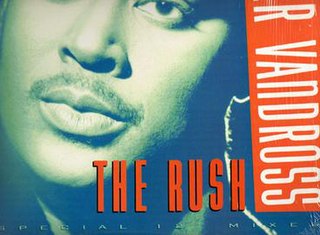Related Research Articles

"Baby Love" is a song by the American music group the Supremes from their second studio album, Where Did Our Love Go. It was written and produced by Motown's main production team Holland–Dozier–Holland and was released on September 17, 1964.

"Stoned Love" is a 1970 hit single recorded by The Supremes for the Motown label. It was the last Billboard Pop Top Ten hit for the group, peaking at number seven, and their last Billboard number-one R&B hit as well, although the trio continued to score top ten hits in the UK into 1972. In the UK, it was the post-Ross Supremes' biggest hit, reaching number 3 in the singles chart. The single spent six weeks in the UK top ten and five weeks in the US top ten. The BBC ranked "Stoned Love" at number 99 on The Top 100 Digital Motown Chart, which ranks Motown releases solely on their all time UK downloads and streams.

"Let's Stay Together" is a song by American singer Al Green from his 1972 album Let's Stay Together. It was produced and recorded by Willie Mitchell, and mixed by Mitchell and Terry Manning. Released as a single in 1971, "Let's Stay Together" reached number 1 on the Billboard Hot 100, and remained on the chart for 16 weeks and also topped Billboard's R&B chart for nine weeks. Billboard ranked it as eleventh-highest selling song of 1972.

"Only You (And You Alone)" (often shortened to "Only You") is a doo wop song composed by Buck Ram, the manager of the Platters, the group that made the song famous in the US, the UK and Belgium. The Platters's lead vocals are by Tony Williams.

"I Can't Get Next to You" is a 1969 No. 1 single recorded by the Temptations and written by Norman Whitfield and Barrett Strong for the Gordy (Motown) label. The song was a No. 1 single on the Billboard Top Pop Singles chart for two weeks in 1969, from October 18 to October 25, replacing "Sugar, Sugar" by the Archies and replaced by "Suspicious Minds" by Elvis Presley. The single was also a No. 1 hit on the Billboard Top R&B Singles for five weeks, from October 4 to November 1, replacing "Oh, What a Night" by the Dells, and replaced by another Motown song, "Baby I'm For Real" by the Originals.

"If I Could Build My Whole World Around You" is a popular song recorded by Marvin Gaye and Tammi Terrell in 1967 and released in November 14, 1967. Written by Harvey Fuqua, Johnny Bristol, and Vernon Bullock, the single was Gaye & Terrell's third single together and the second to go Top Ten on both the Pop and R&B charts of Billboard, peaking at number ten and number two, respectively.

"Let Me Love You" is a song by American singer Mario, released by J Records on October 4, 2004, as the lead single from his second studio album, Turning Point (2004). The song was written by then-unknown American singer Ne-Yo, Kameron Houff, and Scott Storch, while production was handled by the latter. The song garnered Mario a Grammy Award nomination for Best Male R&B Vocal Performance in 2006 and peaked atop five international music charts: the Billboard Hot 100, Canada's Radio & Records, Official German Charts, Dutch Top 40, and Recorded Music NZ.

"Love Is Here and Now You're Gone" is a 1967 song recorded by the Supremes for the Motown label.

"A Love Bizarre" is a song recorded by Sheila E., and written by Prince and Sheila E. The song is a duet between both singers and it appears on Sheila E.'s 1985 album Romance 1600. It clocks in at 12:16, but the single version is 3:46 in duration. It made its debut in the music movie Krush Groove.

"Oh Sheila" is a song by American R&B band Ready for the World. Released as a single in 1985, it reached number one on the US Billboard Hot 100, the Billboard Hot Black Singles chart, and the Billboard Hot Dance/Disco Club Play chart. It was the first of two chart toppers for the band on the Billboard R&B chart, preceding their 1986 number-one R&B hit "Love You Down".

"Best of My Love" is a song by American band the Emotions from their fourth studio album Rejoice (1977). It was composed by Maurice White and Al McKay of Earth, Wind & Fire, and produced by White and Clarence McDonald.

"I'm Still in Love with You" is a song originally recorded by Al Green. Released from the album of the same title, the single spent two weeks at #1 on the Hot Soul Singles chart in August 1972. It also peaked at #3 on the Billboard Hot 100 singles chart that same year. It would eventually sell over one million copies and is considered one of his most popular songs. Billboard ranked it as the No. 59 song for 1972.

"Walk Away from Love" is a song recorded by American singer David Ruffin in 1975. The million-selling single, produced by Van McCoy and written by Charles Kipps, was number one on the US R&B Singles Chart for one week in early 1976, and crossed over to #9 on the Pop Charts. In Canada, the song peaked at #30.
"Funny How Time Slips Away" is a song written by Willie Nelson and first recorded by country singer Billy Walker. Walker's version was issued as a single by Columbia Records in June 1961 and peaked at number 23 on the Hot C&W Sides chart. The song has been featured in several live action films and television shows, such as in the first episode of the second season of AMC’s Better Call Saul and in the 2020 Netflix drama The Devil All the Time.

"When You Talk About Love" is a song recorded by American singer and actress Patti LaBelle. It was written by Ann Nesby, James Harris III, Terry Lewis, and James "Big Jim" Wright for her thirteenth studio album, Flame (1997). Production was helmed by Harris and Lewis, with Wright credited as co-producer. Released as the album's lead single, it became one of the LaBelle's most popular hit singles in the 1990s, reaching number 56 on the US Billboard Hot 100 and number 12 on the Billboard Hot R&B/Hip-Hop Songs chart. A dance remix of the song helped to bring the song to number-one on the Billboard Hot Dance Club Songs chart, making it the fourth number-one dance single in LaBelle's career. The accompanying music video featured LaBelle playing a teacher giving a "class" about love.
"For the Good Times" is a song written by Kris Kristofferson, first recorded by singer Bill Nash in 1968 before appearing on Kristofferson's own debut album in June 1970. After a recording by Ray Price became a #1 hit single in June of that year, the song established Kristofferson as one of country and popular music's top songwriters while giving Price his first chart-topping country and western song in 11 years.

The Rush is a song by American recording R&B artist Luther Vandross', released as the third single from his 1991 album, Power of Love. It reached number six on the US R&B Singles chart and peaked at number 73 on Billboard's Hot 100 in January 1992. The next single to follow was "Sometimes It's Only Love".

"Where Did Our Love Go" is a 1964 song recorded by American music group the Supremes for the Motown label.

Prince released several hundred songs both under his own name and under pseudonyms and/or pen names, as well as writing songs which have been recorded by other artists. Estimates of the actual number of songs written by Prince range anywhere from 500 to well over 1,000. He has released 117 singles, 41 promotional singles, 24 internet singles, and eight internet downloads.
One Way is an American R&B and funk band that was popular in the late 1970s, and throughout most of the 1980s, led by singer Al Hudson. The group's most successful record was "Cutie Pie", which reached number 4 on the Billboard Soul Singles chart and number 61 on the pop chart in 1982.
References
- ↑ White, Adam; Bronson, Fred (1993). The Billboard Book of Number One Rhythm & Blues Hits. Billboard Books:Watson-Guptill Publications, New York. p. 161.
- ↑ "Al Green Is Love - Al Green: Songs, Reviews, Credits". AllMusic. Retrieved 5 March 2018.
- ↑ Whitburn, Joel (2004). Top R&B/Hip-Hop Singles: 1942-2004. Record Research. p. 237.